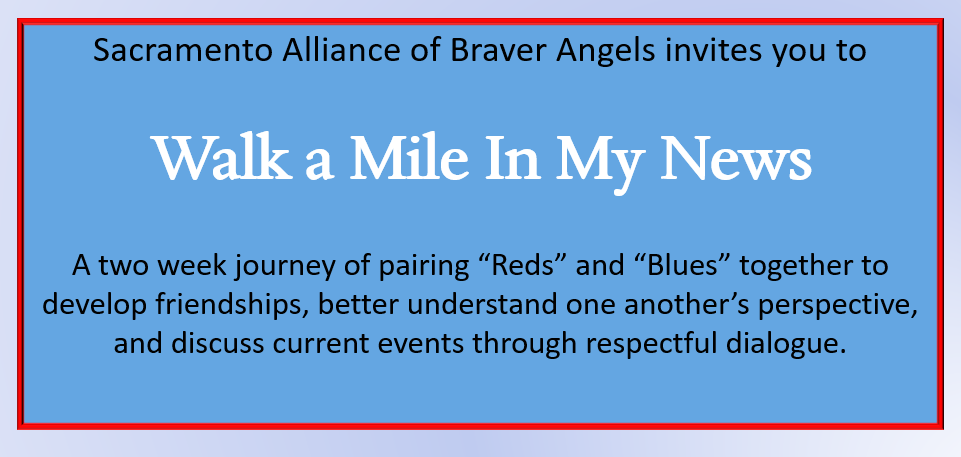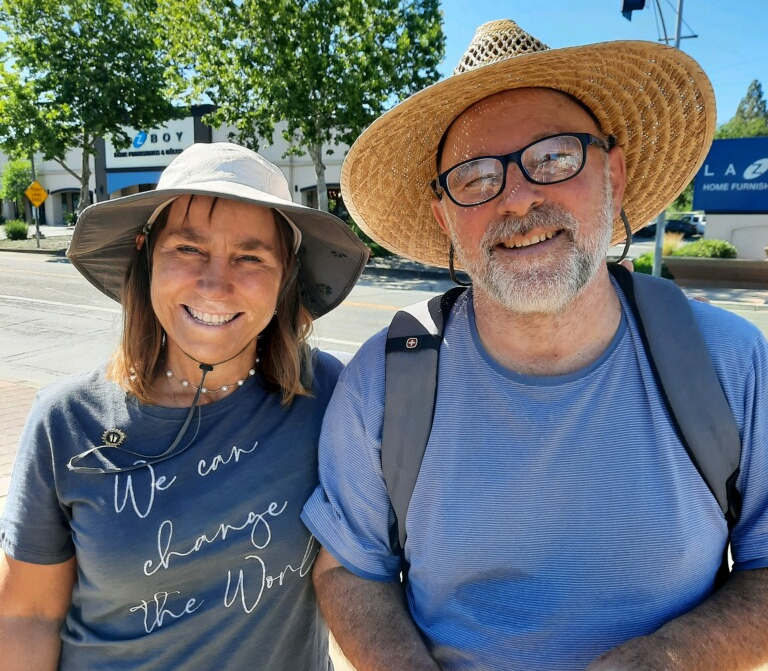Wynette Sills had done several workshops through the Braver Angels Sacramento Alliance when she realized two things. First: She wanted to go deeper. And second: it was time to tackle the biggest force she saw jamming understanding between liberals and conservatives.
The media.
And that’s how a groundbreaking idea was born: “Walk A Mile In My News.”
Wynette, who leans red, brought the concept to fellow red and blue leaders in the Sacramento alliance and they got to work. For months, they designed and piloted a new program until they were ready to launch in April with 26 participants ready to get into it.
But what, exactly, were they getting into?
Taking risks
Walk A Mile In My News is designed to break people out of their media silos by getting them to a) read articles from the other side of the political divide, and b) get to know someone who appreciates what those articles are saying. The program begins with a kickoff meeting where all participants join in on Zoom to connect on the game plan. Then, Wynette pairs them off—one red with one blue—for a two-week, one-on-one series of discussions and email exchanges where each pair gets to know each other, settles on topics they want to talk about, and shares and discusses articles on the positions that matter to them.
Most pairs would get along great. “Some of [the conversations] have been almost boring,” Wynette joked, emphasis on “almost.”
Other exchanges were anything but smooth. And that’s due, in part, to a choice organizers made to give participants loose guardrails for their paired-off conversations, rather than strict structures and agendas.
“This Braver Angels program values freedom of innovation,” reads a telling line in a two-page document summing up the program’s goals and guidelines, including how critical it is to get to know each other before diving into contentious topics, how important it is focus on understanding rather than persuading, and what questions folks can reflect on as they read news from the other side. “Each pair can agree to their own format, approach to this explorative experience, and scheduling details.”
This freedom to set their own path, combined with commitment to multiple meetings and email exchanges, is precisely what Wynette and her fellow organizers hoped would let the pairs take risks and go deeper.
They knew, though, that it would also increase the risk of something else: a communication breakdown.
Like the one that landed in Wynette’s lap one week into the program.
Deeply personal work
After the kickoff meeting, Wynette faced a tricky choice. It was her job to match reds and blues into fruitful pairs, but who should she pair with Michael Hersher, a blue she saw as particularly opinionated, though also intellectually challenging and well prepared? And what about Vera, a blue who’d had a tough go through the program’s pilot? Would another red partner make a difference?
It was a blue who’d pulled Wynette into Braver Angels in the first place, back in 2019, and hardly in an easy context: The man, David Jacobs, was protesting a pro-life ministry outside Women’s Health Specialists, a Sacramento women’s health clinic that offers abortions. And Wynette was helping to lead that ministry.
Wynette is the founder and director of Californians for Life, an organization that’s out to make abortion “unthinkable.” She’s Catholic, and has spent a day a week for 17 years standing on a sidewalk by multiple clinics offering abortions holding signs with messages like, “Pregnant? Need Help?” and “Pray to end abortion.” The counseling that results is deeply personal work to her. As she told Pastor John Jackson in an interview on 710 AM The Word this week, her own conception and birth in 1962—11 years before the landmark Roe v. Wade decision—was a “surprise” for her mother.
“Had abortion been legal then,” she told the pastor, “I might not be here today.”
‘I just see it as survival’
One day in 2019, Wynette got a call from David, whom she hadn’t heard from in a while since the closure of Women’s Health Specialists. He asked her if she wanted to participate in a debate that the Braver Angels Sacramento Alliance was organizing on abortion. Wynette said sure, and the rest is history.
When I learned all this, I asked Wynette how it was possible to be so committed both to one side of a tense political fight and to the depolarization work of Braver Angels.
Wynette didn’t hesitate. To her, understanding how liberals view and talk about issues like abortion is critical to her work.
“As a red dot in a very blue state, I just see it as survival, reality. I have to be an ambassador, a diplomat, a bridge builder,” she said. “I’m identifying a tangible problem and crisis right in front of me, and going to work to bring all the resources across the political divide.”
Wynette decided to match Mike, the committed blue, with an equally committed red she knew well: her husband, Ed Sills.
As for Vera, who wasn’t planning on joining the launch round of “Walk A Mile In My News,” Wynette asked if she’d consider going again—with Wynette herself as the red partner.
“I was kind of surprised, but also touched,” Vera said. “I said, ‘Sure. I will do it.’”
‘This is going to be really hard’
Mike and Ed’s first Zoom call went just fine. Despite being political opposites, they had a few things in common. They both played guitar: Mike at his temple, Ed at his church. They were deeply dedicated to their families, and to working hard and being excellent at whatever they set out to do.
And they both considered themselves well informed about the issues of the day. So when it came time to choose topics to share articles about, they didn’t hold back. Critical race theory made the list. So did gender transition.
Wynette and Vera, meanwhile, learned they were both moms around the same age and picked abortion rights and voter rights. Or rather, “voter rights/election integrity,” to make room for both women’s lenses on that freshly divisive issue.
And they were off.
Vera learned about Wynette’s pro-life advocacy in their very first call. It made her pretty nervous. “I thought, ‘Oh my God this is going to be really hard,’” she recalled thinking.
Wynette sent her links to websites about fetal development. “She said to me several times she thinks this is the human rights issue of the day,” Vera said. Vera found herself asking, what about loss of life from things like climate change? But to Wynette, there was something direct and deliberate about death and abortion that didn’t compare.
President Biden’s child care proposal came up, and Vera was encouraged to hear Wynette say she supported the concept. Late-term abortions were trickier to talk about. They shared stats: A very small percentage of abortions are late-term abortions. But to Wynette, the raw number was still all too significant.
‘I’m done’
The email exchange Mike and Ed had after their first meeting got heated, fast.
Too fast.
As a retired lawyer, Mike spent a lot of time in a “win/lose world,” as he called it, but more as an actor, playing the role of strong advocate for his clients. With “Walk A Mile In My News,” he said, “I wanted to see if I could solve the problem of my own getting angry when I don’t like something. When people get defensive, they get angry. When you feel attacked, you fight back, and then you shut down.”
Ed sums up their downward spiral like this: “We jumped into those polarizing issues—race and gender and things like that. I gave my opinions. Mike fired back pretty hard. I fired back pretty hard.”
That night, Mike emailed Ed to cancel their next Zoom call. It was over, he’d written. “I’m done.”
Too much ‘I’m right, you’re wrong’
After talking to Wynette about abortion, Vera was surprised. Despite neither of them moving an inch from their positions, their conversations about it were not as difficult as she thought they’d be.
When I talked to Wynette about this, I realized this was no accident. Even as an activist Wynette had developed a certain restraint after years of tense conversations with liberals about the political issue she cares most about in the world.
“Whenever I sense that someone’s sensitivities are being stretched, I think, let’s pause there and reconcile and refresh and maybe come back to it at a different time,” Wynette said.
The day after he read Mike’s email quitting the program, Ed wondered if he’d gone too far or said the wrong thing. He had his opinions but he tended to prefer that everyone just get along. He reached out to Wynette, who wasn’t sure what to do. Should she try to nudge Mike back?
She didn’t have to. The two-page document with guidelines for the program lists three key character traits to making it through: curiosity, civility, and interestingly enough, commitment. After a day or two of reflection, Mike emailed Ed to apologize for his part in letting the conversation spin off into too much “I’m right, you’re wrong,” and for giving up. He wanted to try again. Would Ed try again, too?
He would. The two set up another Zoom call, and kept exploring.
Running a 3,000 acre organic farm keeps Ed behind the wheel of his white Dodge Ram pickup. So a lot of what he listens to are podcasts, like Bret Weinstein’s DarkHorse Podcast, and audio clips from places like PragerU. Mike, meanwhile, reads The New York Times, tunes in to Ezra Klein’s new podcast there, and subscribes to a summary of expert analysis across fields called The Conversation.
Mike had never heard of PragerU. After looking into it, he saw it as a media source aimed at getting conservative ideas into young minds. Ed countered that in his view, mainstream news is aimed at getting liberal ideas into everybody’s minds.
‘You’re going to step on a landmine’
Gender transition, too, was something Mike had not looked into before Ed sent him links. Mike spun off from those to do his own research, spending hours learning about gender dysphoria, and evidence for and against the idea that gender transitions for young people are a solution. He ended up not agreeing with Ed’s position on the debate, but understanding why it was important. “This is a serious issue for a kid who’s unhappy trying to figure out how to be more happy,” Mike said.
Ed did not engage Mike’s questions about leaders in the Republican Party he believed showed dishonesty and in some cases, racism. Though one email exchange—the one that led to the communication breakdown, as it happens—ended up leading Mike to an important understanding. He’d sent Ed a link to a piece by David Brooks, a conservative columnist at The New York Times, that included this quote: “When asked in late January if politics is more about ‘enacting good public policy’ or ‘ensuring the survival of the country as we know it,’ 51 percent of Trump Republicans said survival; only 19 percent said policy.”
The poll was conducted by a Republican pollster, and as Mike saw it, looking back, both men read very different things in the concept of “survival of the country as we know it”:
“Ed understood ‘survival’ to be threatened by various moral offenses by liberals such as reverse discrimination, abortion, and the gender transition issue,” Mike said. “When I heard those words I, like most liberals I know, understood ‘survival of the country as we know it’ to mean survival as a White Christian majority country.”
Mike’s takeaway from that exchange and the breakdown that followed? You don’t just need to walk a mile in other people’s news. “You need to walk a mile in a person’s dictionary, or lexicon,” Mike said. “‘Cause when they hear language that’s full of cultural implications and you don’t know it, you’re going to step on a landmine, ‘cause you didn’t see it.”
‘This seems like hyperbole’
Tricker than talking about abortion, for Vera and Wynette, was exchanging links and views on the issue of voter rights / election integrity.
As was the case with Mike and the gender transition issue, Wynette hadn’t spent much time looking deeply at the details of what concerned Vera most then: the law that Georgia had just passed to reform voting.
So it was her turn to do some research.
One thing she discovered that unsettled her? The fact that an early version of the Georgia bill had aimed to restrict Sunday voting, which Vera and many on the left saw as targeting Black churches and Black voters, who lean Democrat.
“That brings into question the whole motive and context for the Republican-controlled process” of reforming elections in Georgia, Wynette said.
At one point, Vera sent Wynette a New York Times article that referred to voter restriction laws as “Jim Crow 2.0.”
“I’m like, this seems like hyperbole,’” Wynette recalls telling Vera. Wynette’s reaction wasn’t something Vera had considered. But after thinking about it for it for several days, she realized something:
“I came to a place where I could see that for Wynette, for the person she is and what she values, that phrase was a disservice to understanding, a disservice to people who stand in her shoes, for whom that just means that this is evidence that Democrats are polarizing something. ‘I’m not racist, I appreciate the racist history of the country.’ So for her, it played into that narrative.”
After that, they agreed to focus on the effects of new voting laws, rather than what for one of them might be loaded terminology.
‘It’s hard to hate someone when you know them’
One moment toward the end of their exchange frustrated Vera. Wynette had sent her a link to an article in the Atlanta Journal-Constitution about two Republican legislators who had intentionally used false signatures on their applications for absentee ballots. When they still received those ballots, they cried foul and argued that verifying those applications should involve a photo ID or identification number. To Wynette, this was something worth noting. To Vera, it was an unscientific, partisan experiment she couldn’t believe Wynette would take seriously. Though Vera said it’s what she heard as a “polarizing” tone from Wynette that most bothered her.
Running this moment by Wynette, she offered her side of it. “I think most blues feel that what Republicans/reds are still stuck on is, was the 2020 election stolen, was there rampant fraud. There is no evidence of such and legal challenges have not shown evidence of that either,” she said. “I was just suggesting to her that there can be errors in the election outcome, errors that are undetected. That it’s not a black and white clear cut situation. As Americans we want to ensure election integrity.”
After Vera told me about this moment and how it disappointed her, I had a burning question to ask: Was she happy that she participated in “Walk A Mile In My News?”
On the Zoom call, I immediately saw Vera nod her head.
“I’m glad I did this,” she said. “There are limits to who I want to engage. But we have to be able to somehow talk to each other and see each other as human beings, and it’s hard to hate someone when you know them, you know something about their lives and what formed them into who they are.”
Besides, she said, “Wynette was genuine. She was so genuine. I was disconcerted at where we landed with voting rights, but it must be hard for her to eke out her position.”
‘It goes beyond the news’
As for Mike and Ed, their disagreements on the polarized issues they discussed led them to a conversation neither of them expected. A conversation about how to handle uncertainty.
“I think what Mike and I have done has gone beyond the superficial,” Ed said. “You can always be diplomatic with people, but then you can’t get deep with them. Say there’s an acquaintance you know you’re going to see at a function. You know there’s a big belief system difference there so you can only talk about certain things. Well that’s fine, but it doesn’t allow you to really open your own mind and question some of your own assumptions.”
David Jacobs, the pro-choice activist who brought Wynette into Braver Angels, also went through “Walk A Mile In My News”—with another red pro-life activist who spends time ministering near clinics that offer abortions.
It was hard to listen to him, David said. No question. But he’d recommend “Walk A Mile In My News” to anybody.
“The hours of conversation have given me a humanized perspective. That perspective is important. It goes beyond the news,” David said.
“News can only give a caricature of a person and issues.”
We’ll have to go and get the real thing ourselves.
Ready to ‘Walk A Mile In My News’?
Wynette and the team at the Braver Angels Sacramento Alliance is ready to take “Walk A Mile In My News” national.
No matter where you are, you are invited to sign up for the second round of Walk A Mile In My News here. The experience involves about five hours of your time over a two-week period. The kickoff meeting is set for June 3 at 6 p.m. PT / 9 p.m. ET., and the reunion meeting at the end of the experience will take place on June 24.






9 thoughts on “Do you have what it takes to ‘Walk A Mile In My News’?”
I would so like to sign up for “Walk a mile in my news’ but I’m 92. I am very discouraged about my beloved planet. We humans have been fouling our nest at a faster and faster rate until it may not revive. That makes me very sad for my heirs. When I graduated from Grand Junction High School in Colorado in 1947, we genuinely believed the world was ours. WWII was over. The economy was good. College was cheap. All was well… How ignorant we were! If I had a Red partner, no matter how committed, I fear my fears and horror would be ignited. I don’t want to play the “poor old lady” card, but I certainly don’t want to be made more frightened and cynical! And I’m a trained listener! –PhD + Clinical Masters in Art Therapy. Any advice?
Hi Marybeth! I see you graduated from GJHS. Do you still live in Grand Junction? I’ve been living in Grand Junction for the past 15 years and am trying to start a Braver Angels Alliance here. If you’re still in town, I’d love to meet you!
Marybeth, please come and observe the “Walk a Mile in My News” Reunion Call tomorrow night, Thursday, June 24th, at 6:00 pm Pacific to hear back from the 30+ Blue-and-Red pairs as they share about their paired experiences, what they learned, what challenged them and what inspired them. I think you might be pleasantly surprised at the kindness and courage these Braver Angels have shown, especially to one another, with beautiful results. Not all pairs have made it across the WMMN “finish line”, but we can learn from their experiences as well! Here is the link https://us02web.zoom.us/meeting/register/tZ0rf-6rqz8jHdK4F_YE8tgnjBBbHAxP3kGq
On my phone, the event description is showing up in black text on a black background, so I can read only the links and headings. I don’t know whether that’s happening for anyone else, or whether it’s something the organizers can address. I thought I’d mention it in case it is fixable. 😊
Pingback: Creatures, Outsourcing Food, and Local News - Front Porch Republic
I didn’t realize my town, Sacramento, was involved in this. Hmmm. In blue but would be open to learning more about this. (I’m pretty sure). My entire family is barely hanging on. I blame that they’re non-thinking passive aggressive fundamentalist still in the Deep South-literally and I want to forget them. I love them but I finally escaped that horrible life and can barely speak to them. Therefore I do have a desire to figure it out. Thank you
“My entire family is barely hanging on.” Yes – we’ve heard from so many folks in the same situation. Seeing things from others’ perspectives, especially if they’re perspectives you find intolerable, is a tall order — but can be a big step toward securing and even learning from your relationships!
Hi Katrina,
You are invited to come and observe the “Walk a Mile in My News” Reunion Call tomorrow night, Thursday, June 24th, at 6:00 pm Pacific to hear back from the 30+ Blue-and-Red pairs as they share about their paired experiences, what they learned, what challenged them and what inspired them! This all started right here in Sacramento! Hope you can participate! Here is the link https://us02web.zoom.us/meeting/register/tZ0rf-6rqz8jHd4F_YE8tgnjBBbHAxP3kGq
This is a message for Wynette Sills, whose email address I have lost.
Wynette, thanks for the work you’re doing. I signed up the “Walk a Mile in My News”, but I guess there were not enough “reds” to go around. As I’ve mentioned before, I’d like to be on a waiting list. More importantly, I had a thought I’d like to share.
How about arranging role plays? “Blues” could pair off and one role play as a “red”. I could REALLY use the practice. Each time I speak to someone I disagree with, I resolve to just listen and ask questions. That lasts about 2 seconds. I need to hone the skill through repeated paractice1 I wish it had been taught in elementary school.
I know you must be quite busy, but I wanted to share that.
thanks.